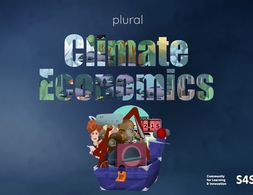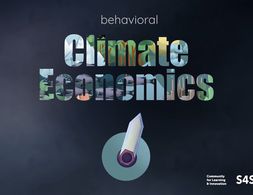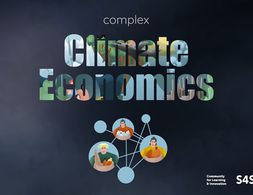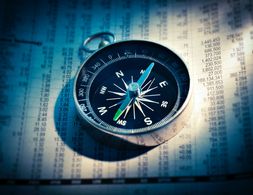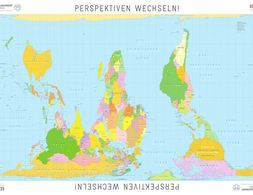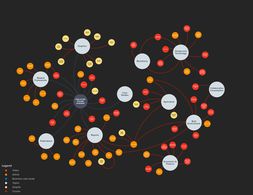183 Ergebnisse
Could working less make people and the planet better off? Find out in this dossier by exploring the landscape of working time reduction policies and their potential for reimagining, restructuring, and redistributing time as a political resource in the 21st century economy.
Can pluralism in economics be useful to tackle the fight against climate change? How can a diversity in methods and ideas allow for a better understanding of the issue of the climate crisis? What solutions do different schools of thought offer to overcome the most pressing challenge of the 21st Century? Our Rethinker Henrika Meyer will give you some answers and give you a glimpse of the solutions pluralism offers to tackle the fight against climate change.
Can pluralism in economics be useful to tackle the fight against climate change? How can diversity in methods and ideas allow for a better understanding of the issue of the climate crisis?
Der vorliegende Beitrag versucht den Einfluss und die Größenordnung der akademischen Bildung in den Wirtschaftswissenschaften, vor allem der Standardlehrbücher, abzuschätzen und fragt kritisch, auf welchem Bildungsverständnis die moderne Wirtschaftswissenschaft implizit beruht.
Can pluralism in economics be useful to tackle the fight against climate change? How can diversity in methods and ideas allow for a better understanding of the issue of the climate crisis? What solutions do different schools of thought offer to overcome the most pressing challenge of the 21st Century? Our Rethinker Henrika Meyer will give you some answers and give you a glimpse of the solutions pluralism offers to tackle the fight against climate change.
Foto von Markus Spiske Dieses Dossier ist im Rahmen der Schreibwerkstatt Ecological Economics einer Kooperation zwischen der TU Berlin und Exploring Economics entstanden Weitere Informationen und Dossiers zu der Thematik findet Ihr hier Neue Allianzen für Nachhaltigkeitspolitik Autor innen Lisa Leonhardt Greta Lenk Felix Englisch Vera Huwe Review Gerrit von …
Trotz aller Härte des ökonomischen, politischen und gesellschaftlichen Wettbewerbs realisieren viele Unternehmer auch heute noch selbstverständlich eine sozial und ökologisch orientierte Unternehmens- und Mitarbeiterführung auf einer soliden wirtschaftlichen Basis. Sie gestalten Unternehmenskulturen, die etwa auf Kooperation, Fairness und Verantwortung beruhen – sei dies in Familienunternehmen, kleinen und mittleren Unternehmen oder in Großunternehmen. In diesem Beitrag zeige ich, wie Bildung zu einer wesentlichen Quelle für eine solche Gestaltung werden kann. Damit beziehe ich mich insbesondere auf die höhere Bildung, also das Studium an Hochschulen und Universitäten und wende mich exemplarisch den Anliegen und Aktivitäten der Cusanus Hochschule zu.
Zunehmend wird die ökonomische Standardbildung für ihre Weltfremdheit, Einseitigkeit und Unreflektiertheit kritisiert. Die Autorin fragt nach den möglichen Wirkungen und gesellschaftlichen Bedeutungen dieses kritisierten Zustandes: Vermag er einer blinden Marktgläubigkeit Vorschub zu leisten, die selbst wiederum als wesentlich für die öffentliche Meinungsbildung in den letzten Jahrzehnten anzusehen ist?
Welche Kriterien spielen hierfür eine Rolle? Der Artikel geht diesen Fragen nach, indem er in historischer Perspektive wesentliche Zusammenhänge zwischen Strategien der Beeinflussung der „öffentlichen Meinung“ einerseits sowie der Wissenschaft und Lehre andererseits herausarbeitet, wie sie am Neoliberalismus und seinen Protagonisten Walter Lippmann und Friedrich A. Hayek beobachtet werden können. Zudem wird eine Skizze einer grundlegend alternativen Bildungsform, einer Bildung für ökonomische Mündigkeit, entworfen.
Wirtschaftswachstum und Bildungswiderstand: Von der Freiheit und Unfreiheit des ökonomischen Denkens
Der Aufsatz diskutiert die Berechtigung von wirtschaftlichem Wachstum als wichtigstes gesellschaftliches Ziel der Gegenwart, seine Genese in der Theoriegeschichte seit dem 2. Weltkrieg und welche Wirkungen von diesem Konzept auf das ökonomische Denken ausgegangen sind. Es wird argumentiert, dass es einer neuen ökonomischen Bildung bedarf, die ein Verständnis für reale Zusammenhänge und ein Wissen um konkrete Dinge fördert, die unmittelbar an Fragestellungen des Lebens orientiert sind.
Wie selbstverständlich geht die heutige ökonomische Standardlehre davon aus, dass sie Studierenden eine feste und unveränderliche Sicht auf die Welt vermitteln kann. Doch woher kommt diese Annahme? Walter Lippmann, einer der Begründer des Neoliberalismus, gibt hierauf einen ersten Hinweis: Wirtschaftswissenschaft soll in der Lage sein, Bilder in Köpfen von Menschen zu verankern, die allem Denken und Handeln unbewusst zugrunde liegen, selbst aber nicht schöpferisch veränderbar sind. Anhand dreier Stationen – ausgesuchten Textpassagen von Adam Smith, John Stuart Mill und Léon Walras – zeigt der Beitrag, wie die Wirtschaftswissenschaft hierfür das Denken umformen musste: hin zu einem rein erfahrungsunabhängigen Denken, das seine Inspiration nicht aus der Begegnung mit der Wirklichkeit, sondern allein aus der reinen Mathematik und Mechanik übernimmt. Zugleich zeigt die philosophische Auseinandersetzung mit der Geschichte dieser Wissenschaft, dass diese Umformung selbst weder zwangsläufig noch alternativlos ist. Auch in der Ökonomie lässt sich die schöpferische Kraft des Denkens zurückgewinnen.
Im Folgenden wird untersucht welche Antworten die Wirtschaftswissenschaften auf die Frage geben, welchen Einfluss das Geld in der Gegenwart auf unser Denken und Handeln ausübt. Dabei wird deutlich, dass der Mainstream der Wirtschaftswissenschaften das Geld als einen Denkzwang stets voraussetzt und so Menschen nicht befähigen kann, diese Denklogik zu überwinden. Schlussfolgernd werden u.a. mit Rekurs auf ausgewählte Philosophien Erkenntniswege aufgespürt, um die in den Wirtschaftswissenschaften implizierten Bewusstseinsformen systematisch zu vertiefen und ihre Grenzen aufzusprengen.
Oft werden Universitäten mit neutraler Wissenschaft verbunden und das von Dozierenden vermittelte Wissen als Abbildung der Realität wahrgenommen. Nur selten ist es Gegenstand kritischer Auseinandersetzungen. Wissenschaft findet jedoch in keinem neutralen Raum statt, sondern ist von Machtstrukturen und somit auch oft von diskriminierenden Denkweisen geprägt. Genau hier setzt unser Projekt an, mit dem wir einen Beitrag zur kritischen, interdisziplinären Auseinandersetzung mit Rassifizierung und Diskriminierung an der Universität Bayreuth und darüber hinaus leisten wollen. Unser Interesse am Thema Rassifizierung im Kontext universitärer Lehre und Forschung entstammt dabei der kritischen Auseinandersetzung mit den Lehrinhalten der Vorlesung „Ökonomik der Entwicklungsländer“ von Prof. Dr. Martin Leschke sowie mit dem begleitenden Lehrbuch „Ökonomik der Entwicklung – Eine Einführung aus institutionenökonomischer Sicht“. Als uns Themen und Begriffe auffielen, die unserer Einschätzung nach in ihrer Verwendung nicht dem aktuellen Umgang mit postkolonialen Machtverhältnissen und Eurozentrismus entsprachen, kam uns die Idee, eine kritische Begleitschrift zu besagtem Lehrbuch zu verfassen.
This paper starts with an evaluation of three common arguments against pluralism in economics: (1) the claim that economics is already pluralist, (2) the argument that if there was the need for greater plurality, it would emerge on its own, and (3) the assertion that pluralism means ‘anything goes’ and is thus unscientific. Pluralist responses to all three arguments are summarized. The third argument is identified to relate to a greater challenge for pluralism: an epistemological trade-off between diversity and consensus that suggests moving from a discussion about ‘pros’ and ‘cons’ towards a discussion about the adequate degree of plurality. We instantiate the trade-off by showing how it originates from two main challenges: the need to derive adequate quality criteria for a pluralist economics, and the necessity to propose strategies that ensure the communication across different research programs. The paper concludes with some strategies to meet these challenges.
By conducting a discourse analysis (SKAD) in the field of academic economics textbooks, this paper aims at reconstructing frames and identity options offered to undergraduate students relating to the questions ‘Why study economics?’ and ‘Who do I become by studying economics?’. The analysis showed three major frames and respective identity offerings, all of which are contextualized theoretically, with prominent reference to the Foucauldian reflection of the science of Political Economy. Surprisingly, none of them encourages the student to think critically, as could have been expected in a pedagogical context. Taken together, economics textbooks appear as a “total structure of actions brought to bear upon possible action” (Foucault), therefore, as a genuine example of Foucauldian power structures.
The current Great Recession, the worst crisis that capitalism has faced since the Great Depression, has failed, at least so far, to generate a change in the teaching and practice of Macroeconomics. This seems bizarre as if nothing has happened and the economists are just going about doing business as usual. In light of this, the current paper attempts to address how Macroeconomics ought to be taught to students at the advanced intermediate level, which gives them an overall perspective on the subject.
This is an introductory level core course in macroeconomics for those expecting to take further courses in economics. It provides a theoretical and applied approach of introductory macroeconomics, with an international perspective and applications to account for the growing importance of the global economy and the rising openness of economies.
Teaching and learning ontology and epistemology. Onto-what? Bates & Jenkins explain what is needed to equip students with the ability to critically reflect on learned content and understand meta-discussions in their field.
The resource map contains links to a collection of resources related to the circular economy, which include videos, presentations, graphics, business case studies and articles. Many of the resources were created by the Ellen MacArthur Foundation, others are given credit where due.
Diese Vorlesung beschäftigt sich mit grundlegenden Elementen sozialphilosophischen Denkens mit besonderem Fokus auf Schnittmenge zwischen Sozialphilosophie und politischer Ökonomie. Im Zentrum steht die Vermittlung von Kenntnissen über die zentralen Fragestellungen, die historische Genese, sowie wesentliche, prägende Beiträge der Sozialphilosophie und Politischen Ökonomie.
This course introduces students to the relevance of gender relations in economics as a discipline and in economic processes and outcomes. The course covers three main components of gender in economics and the economy: (1) the gendered nature of the construction and reproduction of economic theory and thought; (2) the relevance and role of gender in economic decision-making; and (3) differences in economic outcomes based on gender. We will touch on the relevance of gender and gender relations in at least each of the following topics: economic theory; the history of economic thought; human capital accumulation; labor market discrimination; macroeconomic policy, including gender budgeting; household economics; basic econometrics; economic history; and economic crises.
This course introduces students to political economy and the history of economic thought. We will cover the core ideas in various schools of economic thought, positioning them in the historical and institutional context in which they were developed. In particular, we will cover some economic ideas from the ancient world and the middle ages; the enlightenment; the emergence of and main ideas in classical political economy (Adam Smith, David Ricardo, Thomas Malthus, and others); Marx, Mill, and Keynes; European versus American economic thought through history; the rise of mathematical economics; economic theories around state-managed economies versus socialism; Austrian economics; behavioral economics; and the future of economics.
This course introduces students to the relevance of gender relations in economics as a discipline and in economic processes and outcomes. The course covers three main components of gender in economics and the economy: (1) the gendered nature of the construction and reproduction of economic theory and thought; (2) the relevance and role of gender in economic decision-making; and (3) differences in economic outcomes based on gender. We wil touch on the relevance of gender and gender relations in at least each of the following topics: economic theory; the history of economic thought; human capital accumulation; labor market discrimination; macroeconomic policy, including gender budgeting; household economics; basic econometrics; and economic crises.
This course will introduce key concepts, theories and methods from socioeconomics. The first part of the course, will deal with the main economic actors and how their interactions are governed. Markets are seen as sets of social institutions. Institutions shape how consumers, firms and other economic actors behave. While it is difficult to understand how novelty emerges, we can study the conditions that are conducive to innovation. We will review how economic performance, social progress and human wellbeing are measured and what progress has been made. In the second part of the course, we will study a specific macroeconomic model that accounts for biophysical boundaries and inequality.
The module is designed to first present some of the main schools of thought from a historical and methodological perspective. Each week we explore and critically assess the main tenants of each school of thought. In the second part of the module we link history of economic thought and methodology to a specific and contemporary economic question. The second part allows you to engage with current economic issues with an awareness of methodology and methodological differences and with some knowledge of the history of economics.
Das Ziel des Seminars ist die Vermittlung grundlegender Elemente sozioökonomischen Denkens, insbesondere Kenntnisse über zentrale Fragestellungen, die historische Genese, aktuelle Forschungsprobleme und zeitgenössische Anwendungen der Sozioökonomie. Die TeilnehmerInnen werden dabei schrittweise in unterschiedliche Aspekte sozioökonomischer Forschungstätigkeit eingeführt und haben dabei die Möglichkeit das erworbene Wissen in praktischen Übungen anzuwenden.
Jeden Freitag streiken weltweit Schüler/innen für unsere Zukunft. Sie fordern radikale Maßnahmen für die Einhaltung des Pariser Klimaabkommens ein. In diesem Seminar werden wir uns aus der Perspektive der ökologischen Ökonomie mit ihrer Kritik auseinandersetzen. Im Fokus stehen dabei Ansätze einer Postwachstumsökonomie.
This course provides future change makers in public and private sectors with a comprehensive overview on the structures and actors that shape markets.
This course focus on the behaviour of individuals from an pluralist economic and an interdisciplinary bevavioural science apprach.
This module examines current socio-political issues through the lens of pluralism, that is pluralism of theory, pluralism of method and interdisciplinary pluralism
Ziel dieses Seminars ist, eine Einführung in die wissenschaftstheoretischen und methodischen Grundlagen der Sozial- und Wirtschaftswissenschaften zu bieten.
Das Seminar "Einführung in die Plurale Ökonomik" bietet einen systematischen Einstieg in die ökonomische Theoriegeschichte und gibt einen Überblick über verschiedene ökonomische Theorieschulen, wie z.B. Verhaltensökonomik, Institutionelle Ökonomie, Postkeynesianismus, Ökologische Ökonomie und kritische Entwicklungsökonomie.
Introduction Economics is by necessity a multi paradigmatic science Several theoretical structures exist side by side and each theory can never be more than a partial theory Rothschild 1999 Likening scientific work to the self coordinating invisible hand of the market Michael Polanyi cautioned strongly against centralized attempts to steer …
Wir nutzen Cookies. Klicke auf "Akzeptieren" um uns dabei zu helfen, Exploring Economics immer besser zu machen!


